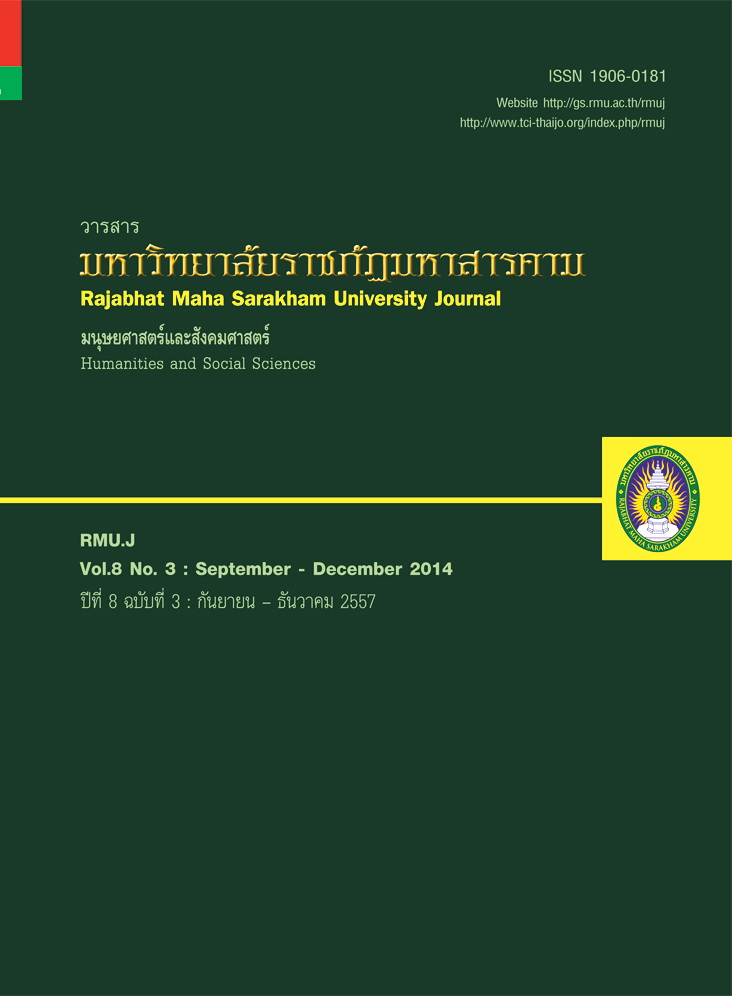การพัฒนารูปแบบการเรียนการสอนวิชาเคมี ตามแนวคิดการเรียนรู้โดยใช้ บริบทและปัญหาเป็นฐาน สำหรับนักศึกษาหลักสูตรปริญญาบัณฑิต The Development of a Chemistry Subject Instruction Model Based on Context and a Problem-Based Learning Approach for Undergraduate Stude
Main Article Content
บทคัดย่อ
การวิจัยครั้งนี้มีวัตถุประสงค์ ประการแรก เพื่อพัฒนารูปแบบการเรียนการสอนวิชาเคมี ตามแนวคิดการเรียนรู้โดยใช้บริบท
และปัญหาเป็นฐานสำหรับนักศึกษาหลักสูตรปริญญาบัณฑิต และประการที่สอง ศึกษาผลการใช้รูปแบบการเรียนการสอน วิธีดำเนิน
การวิจัยประกอบด้วย 1) พัฒนารูปแบบการเรียนการสอน 2) สร้างและหาคุณภาพเครื่องมือเก็บรวบรวมข้อมูล และ 3) ทดลองใช้รูป
แบบการเรียนการสอน กลุ่มตัวอย่างเป็นนักศึกษามหาวิทยาลัยเทคโนโลยีราชมงคลอีสาน วิทยาเขตสกลนคร แบ่งออกเป็นนักศึกษา
กลุ่มทดลอง 25 คน และกลุ่มควบคุม 36 คน เครื่องมือที่ใช้ในการเก็บรวบรวมข้อมูล ได้แก่ แบบวัดทักษะกระบวนการทางวิทยาศาสตร์
แบบวัดความสามารถในการคิดแก้ปัญหา แบบวัดผลสัมฤทธิ์ทางการเรียน และแบบวัดเจตคติเชิงวิทยาศาสตร์ สถิติที่ใช้ในการวิจัย
ได้แก่ ค่าเฉลี่ย ค่าเบี่ยงเบนมาตรฐาน t-test (Dependent samples) และ F-test (One-way ANCOVA) ผลการวิจัยพบว่า
1. รูปแบบการเรียนการสอนที่พัฒนาขึ้น มีองค์ประกอบดังนี้ 1) ที่มาและความสำคัญ 2) ทฤษฎีและแนวคิดพื้นฐาน
3) หลักการ 4) จุดมุ่งหมาย 5) ขั้นตอนกระบวนการเรียนการสอน และ6) การวัดและประเมินผลการเรียนการสอน
2. นักศึกษากลุ่มทดลองหลังเรียนมีทักษะกระบวนการทางวิทยาศาสตร์ ความสามารถในการคิดแก้ปัญหา ผลสัมฤทธิ์ทางการ
เรียน และเจตคติเชิงวิทยาศาสตรส์ ูงกวา่ กอ่ นเรียนอยา่ งมีนัยสำคัญทางสถิติที่ระดับ.01 และมีทักษะกระบวนการทางวิทยาศาสตร ์ ความ
สามารถในการคิดแกป้ ญั หา ผลสมั ฤทธิ์ทางการเรยี น และเจตคตเิ ชิงวิทยาศาสตรส์ งู กวา่ นกั ศึกษากลมุ่ ควบคมุ อยา่ งมนี ัยสาํ คัญทางสถติ ิ
ที่ระดับ .01
The purposes of this research were 1) to develop an instruction model for undergraduate chemistry
coursework, based on context and a problem-based learning approach, and 2) to investigate the effects of
using the learning management model. The research procedure consisted of 3 steps: the first, development
of the learning management model; the second, the construction and quality of the research tools; and the
third, experiment of the developed learning management model. The subjects were students at Rajamangala
University of Technology, Isan Sakon Nakhon campus, and were divided into two groups: the experiment group with 25 students and the control group with 36 students. The data was analyzed using means, standard
deviation, dependent samples, t-test, and F-test (One - way ANCOVA).
The results of this research were as follows :
1. The developed instruction model consisted of 1) source and importance, 2) theory and basic
concepts, 3) principle, 4) objective, 5) instruction procedure, and 6) measurement and evaluation.
2. The experimental group showed gains in science process skills, problem solving abilities, learning
achievement, and scientific attitudes from before learning via the developed model by a .01 level of significance.
Also, they indicated higher mean scores of science process skills, problem solving abilities, learning
achievement, and scientific attitudes than the control group students who learned using the conventional
teaching method by a .01 level of significance.
Article Details
1. บทความที่ลงตีพิมพ์ทุกเรื่องได้รับการตรวจทางวิชาการโดยผู้ประเมินอิสระ ผู้ทรงคุณวุฒิ (Peer Review) สาขาที่เกี่ยวข้อง อย่างน้อย 3 ท่าน ในรูปแบบ Double blind review
2. ข้อคิดเห็นใด ๆ ของบทความที่ลงตีพิมพ์ในวารสารมหาวิทยาลัยราชภัฏมหาสารคาม นี้เป็นของผู้เขียน คณะผู้จัดทำวารสารไม่จำเป็นต้องเห็นด้วย
3. กองบรรณาธิการวารสารมหาวิทยาลัยราชภัฏมหาสารคาม ไม่สงวนสิทธิ์การคัดลอกแต่ให้อ้างอิงแสดงที่มา


